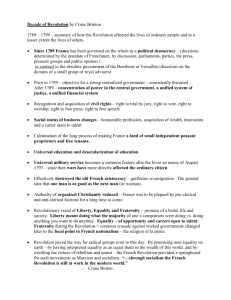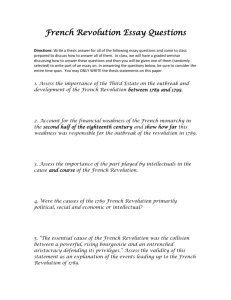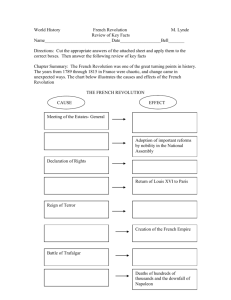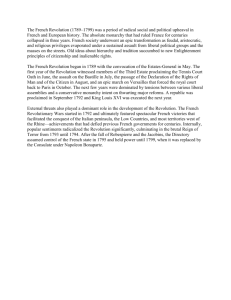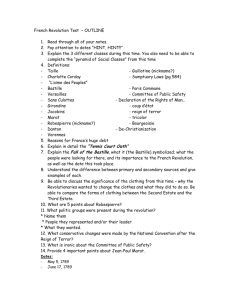The August Decrees were of great importance for another reason
advertisement
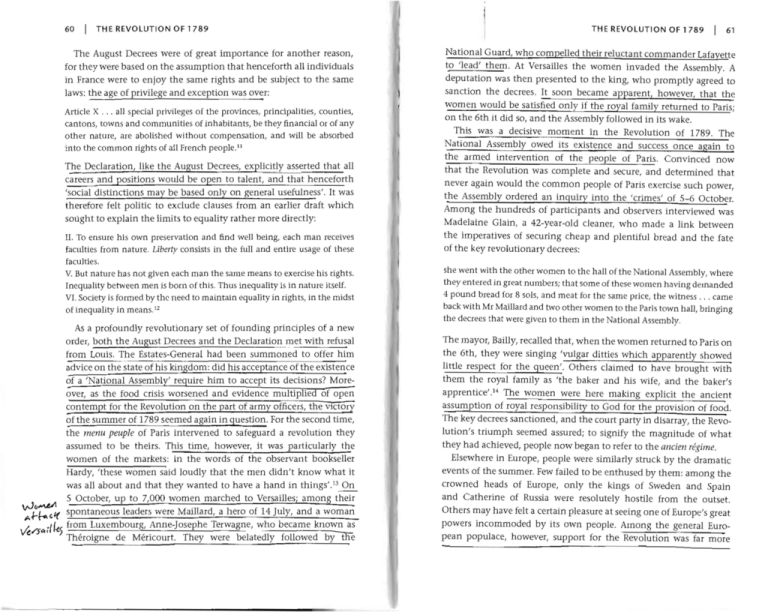
60
I
THE REVOLUTION OF 1789
The August Decrees were of great importance for another reason,
for they were based on the assumption that henceforth all individuals
in France were to enjoy the same rights and be subject to the same
laws: the age of privilege and exception was over:
Article X ... all special privileges of the provinces, principalities, counties,
cantons, towns and communities of inhabitants, be they financial or of any
other nature, are abolished without compensation, and will be absorbed
into the common rights of all French people."
The Declaration, like the August Decrees, explicitly asserted that all
careers and positions would be open to talent, and that henceforth
'social distinctions may be based only on general usefulness'. It was
therefore felt politic to exclude clauses from an earlier draft which
sought to explain the limits to equality rather more directly:
II. To ensure his own preservation and find well being, each man receives
faculties from nature. Libelty consists in the full and entire usage of these
faculties.
V. But nature has not given each man the same means to exercise his rights.
Inequality between men is born of thiS. Thus inequality is in nature itself.
VI. Society is formed by the need to maintain equality in rights, in the midst
of inequality in means. 12
As a profoundly revolutionary set of founding principles of a new
order, both the August Decrees and the Declarati0E..met with refusal
from Louis, The Estates-General had been summoned to offer him
advice on the state of his kingdom: did his acceptance of the existence
~f a 'National Assembly' reguire him to accept its decisions? More­
over, as the food crisis worsened and evidence multiplied of open
contempt for the Revolution on the part of army officers, the victo,q
;f the summer of 1789 seemed again in question. For the second time,
the menu peuple of Paris intervened to safeguard a revolution they
assumed to be theirs, This time, however, it was particularly the
women of the markets: in the words of the observant bookseller
Hardy, 'these women said loudly that the men didn't know what it
was all about and that they wanted to have a hand in things' .13 On
5 October, up to 7,000 women marched to Versaillesj among their
~t~&( spontaneous leaders were Maillard, a hero of 14 July, and a woman
.v~""'5Ct'
/ -/'5
from Luxembourg, Anne-Josephe Terwagne, who became known as
K
. . _
Theroigne de Mericourt. They were belatedly followed by the
THE REVOLUTION OF 1789
61
National Guard, who compelled their reluctant commander Lafayette
to 'lead' them. At Versailles the women invaded the Assembly. A
deputation was then presented to the king, who promptly agreed to
sanction the decrees, It soon became apparent, however, that the
women would be satisfied only if the royal family returned to Paris;
on the 6th it did so, and the Assembly followed in its wake.
This was a decisive moment in the Revolution of 1789. The
National Assembly owed its existence and success once again to
the armed intervention of the people of Paris. Convinced now
that the Revolution was complete and secure, and determined that
never again would the common people of Paris exercise such power,
the Assembly ordered an inguiry into the 'crimes' of 5-6 October.
Among the hundreds of participants and observers interviewed was
Madelaine Glain, a 42-year-old deaner, who milde a link between
the imperatives of securing cheap and plentiful bread and the fate
of the key revolutionary decrees:
she went with the other women to the hall of the National Assembly, where
they entered in great numbers; that some of these women having demanded
4 pound bread for 8 sols, and meat for the same price, the witness. , . came
back with Mr Milillard and two other women to the Paris town hall, bringing
the decrees that were given to them in the National Assembly.
The mayor, Bailly, recalled that, when the women returned to Paris on
the 6th, they were singing 'vulgar ditties which apparently showed
little respect for the queen'. Others claimed to have brought with
them the royal family as 'the baker and his Wife, and the baker's
apprentice'.14 The women were here making explicit the ancient
assumption of royal responSibility to God for the provision of food.
The key decrees sanctioned, and the court party in disarray, the Revo­
lution's triumph seemed assured; to signify the magnitude of what
they had achieved, people now began to refer to the ancien regirne,
Elsewhere in Europe, people were similarly struck by the dramatic
events of the summer. Few failed to be enthused by them: among the
crowned heads of Europe, only the kings of Sweden and Spain
and Catherine of Russia were resolutely hostile from the outset.
Others may have felt a certain pleasure at seeing one of Europe's great
powers incommoded by its own people. Among the general Euro­
pean populace, however, support for the Revolution was far more
.;;;{
.:l
id.~
(M
f
THE REVOLUTION OF 1789
THE REVOLUTION OF 1 789
62
common, and there were few obvious 'counter-revolutionaries' such
as Edmund Burke. While many in England started to become dis­
turbed at reports of punitive bloodshed or when the National
Assembly quickly ruled out the possibility of emulating Britain's
bicameral system, with its House of Lords, most were openly enthusi­
astic. Poets such as Wordsworth, Burns, Coleridge, Southey, and Blake
joined with their creative peers in Germany and Italy (such as
Beethoven, Fichte, Hegel, Kant, and Herder) in celebrating what was
seen as an exemplary moment of liberation in the history of the
European spirit. Lafayette had sent a set of the keys of the nastille to
George Washington as 'a tribute which lowe as a son to my adoptive
father, as an aide-de-camp to my general, and as a missi9.~'lIY of lib­
erty to its patriarch'. In turn, Washington, elected six months earlier
as first president of the United States, wrote to his envoy in France,
Gouverneur Morris, on 13 October: 'The revolution which has been
effected in France is of so wonderful a nature, that the mind gn
l2.ardly recognise the fact. ff it ends as ... [I] predict, that nation will
[
be the most powerful and happy in Europe.'
Jostling with the potent sense of euphoria and unity in the autumn
of 1789 was the realization of how revolution had been achieved and
the magnitude of what remained to be done. The Revoluti.on of the
bourgeois deputies had only been secured by the active intervention
of the working people of Paris; the deputies' misgivings were
ex~ssed in the temporary proclamation of martial law on 21 Octo­
ber. On the other hand, Louis's reluctant consent to change was only
thinly disgUised by the fiction that his obstinacy was solely due to the
malign influence of his court. Most important of all, the revolu.~ionar­
ies' declaration of the principles of the new regime presupposed that
~ery aspect of public life would be reshaped. To that task they now
turned.
Notes
1. Ave etle credo £Ill tiers-etat (n.p., 1789).
2. J. M. Thompson (ed.), English Witnesses of the French Revolutioll (Oxford,
1938),58; Aileen Ribeiro, Fashion in t:he French Revolution (London, 1988),46. On the
elections of 1789, see Malcolm Crook, Electio1ls in the French Revolution: An
Apprenticeship in Democracy, 1789-1799 (Cambridge, 1996), ch. 1.
63
3. Gazette tlat/(ma/(' all Ie Mon/tew Imiversd. no. 10, 20-4 June 1789, vol. 1, 89.
Charles Panckoucke, publisher of the Encyclopedle, was the proprietor of this paper,
which linked the pre-revolutionary Ga7.rt"te to the 'patriotic' Monlteur. With its
repJint in the 18405, it is an invaluable source for parliamentary debat.es.
4. Dale Van Kley, The Religious
1996),349.
O,.(~ns
of the French Revolution (New Haven,
5. George Rude, The Crowd ill the French Revolution (Oxford, 1959), 46.
6. On the storming of the Bastille, sec ibid., cll. 4; and Jacques Godecllot, The
Tllking oftile Bastille: fuly 14th, 1789, trans. Jean Stewart (London, 1970).
7. Schama, Citizens, 446; II'S Revollll"iOln de Pllris, no. 1, 12-18July 17R9, 17-19,
no. 2, 18-25 July 171)9, lR-25. An excellent collection of newspaper articles is J.
Gilchrist and W. .J. Murray (cds.), The Press in the French Rel'olul.ion (Melbourne,
1971).
8. Arthur Young, Travels;n France dl/ring tile Years 1789-1788-1789 (New York,
1969).
9. Amwles historique.l de la Revolution franraise (1955), 161-2. The rural revolt is
the subject of the classic 1932 study by Georges Ldebvre, Till' Great. Fea,. of ] 789:
Rural Panic in Revolllt"!onary France, trans. Joan White (New York, 1973); a recent
,tudy is Clay Ramsay, The Ideolo8Y of the Great Fear: The Soisson/wis in 1789 (Balti­
more, 1992).
10. 'Cahier des doleanccs lOt reclamations des femmes par Mme. B... B...,
1789', in Cahiers des dolchll1cl's des femmes 1'1' autres textes (Paris, 1981),47-59.
11. MrJr/iteur nniversel, no. 40, 11-J 4 August 1789, vol. 1, 332-3.
12. Mon/teur IIniversel, no. 44, 20 August 1789, vol. 2, 362-3; Archives parlemen­
to/res, 2 September 1791,151-2. There is a detailed discussion of the Declaration in
Dale Van Kley (ed.), The Frmch Idea ofFreedom: The Old Regime and tile Declaration of
Rights of 1789 (Stanford, Calif., 1994).
13. Rude, Crowd in the French Revoilition, 69 and ell. 5.
14. Reimpression de l'Ancien Monitel/!; 51'1111' histoire authentique 1'1' inalteree de la
Revoilition (ranr£1ise, depuis la n!rm;o/l des E/:als-Generallx jusqu'al1 COnlll/at, 32 vols.
(Paris, 1847), vol. 2,1789,544; Cobb and Jones (eds.), Voices of I'he Fre/1CIzRevolution,
88.
